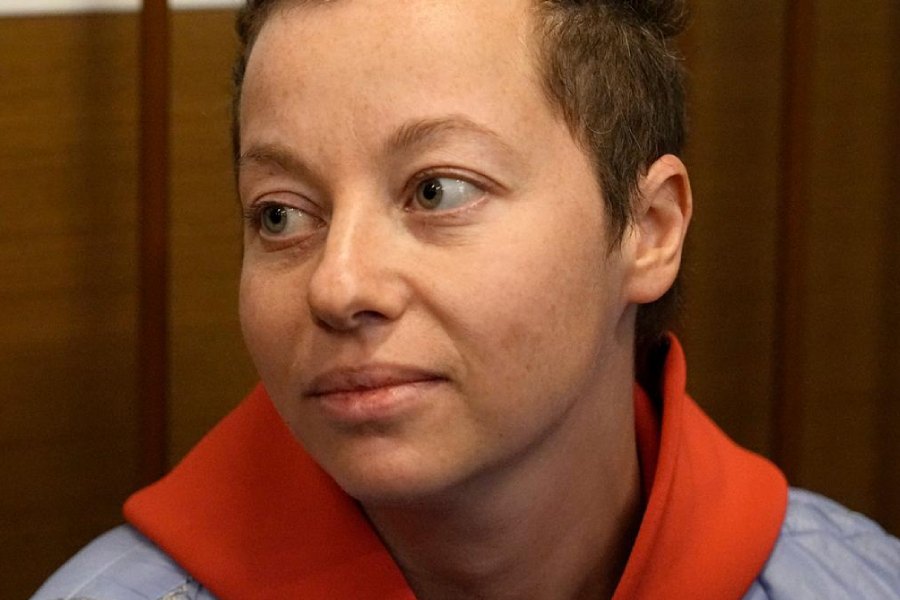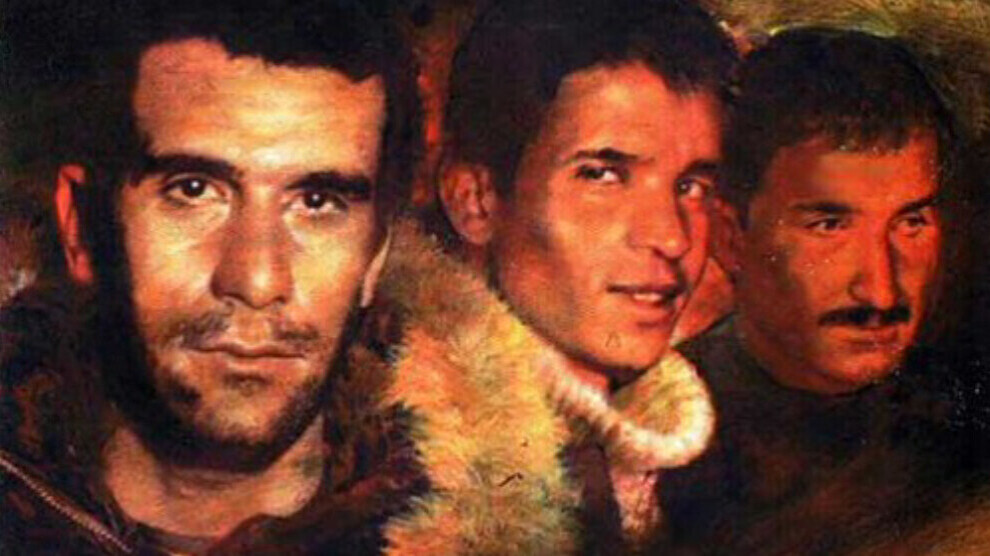EXCERPT
Mao’s Legacy Is a Dangerous Topic in China
Discussing the Cultural Revolution has become increasingly risky.
Paramilitary police officers march past the portrait of Chinese leader Mao Zedong on Tiananmen Gate as it undergoes renovations in Beijing on May 18, 2019.
GREG BAKER/AFP VIA GETTY IMAGES
“For Chinese people, history is our religion,” the intellectual Hu Ping has argued. “We don’t have a supernatural standard of right and wrong, good and bad, so we view History as the ultimate judge.” The Chinese Communist Party has finessed this tradition. It sees history not as a record, still less a debate, but a tool. It can be adjusted as necessary yet appears solid and immutable: Today’s imperatives seem graven in stone, today’s facts the outcome of a logical, inexorable process. The contingencies and contradictions of the actual past are irrelevant. The truth is what the Party says, and what the Party chooses to remember.
Its current narrative is enshrined in the National Museum of China. It stands in Tiananmen Square, directly opposite the Great Hall of the People, where grand political ceremonies are held; across the way hangs the portrait of late Chinese leader Mao Zedong, stretching 4.5 by 6 meters and reputedly 1.5 tons in weight. The picture morphed through a few incarnations before Mao approved its final template at the height of the Cultural Revolution. Now it is replaced with an identical version each year, just before October’s National Day celebrations. At least one spare is kept at the ready in case it is damaged, as in 1989, when dissidents pelted it with eggs (and paid with years in prison). Come what may, Mao continues to surveil his successors and his country. Most assume that the picture will hang there as long as the Party hangs on to power, so symbolic that the leadership would never dare remove it.
For centuries, this part of the city has been the political heart of the nation. The square lies in front of the Forbidden City, home of the emperors, on Beijing’s north-south central axis. Under Mao its size was quadrupled to 400,000 square meters, making it the world’s largest city square. The Great Hall of the People and what were then the twin Museums of the Chinese Revolution and Chinese History were completed in the same year, 1959, as part of a monumental building program marking the Party’s tenth year in power. It had established already that its rule depended not only on the promise of a better future, but also on a shared understanding of that pledge’s contrast with former misery. So the grand museums were erected, and workers and peasants were encouraged to dwell on long-gone injustices in rituals of “recalling past bitterness and cherishing present happiness.” The people were still developing their political consciousness. Sometimes they included the terrible famine just past in their list of miseries, but officials would quickly set them straight, reminding them that Past Bitterness meant the years before the Party came to power.
Mao is seen at a Red Guard rally in Tiananmen Square in 1966. His followers wave their “Little Red Books” as he passes.
KEYSTONE/GETTY IMAGES
For Chinese people, Tiananmen Square is their history. It saw the nationalist student protests of the May Fourth Movement in 1919, Mao’s proclamation of the founding of the People’s Republic thirty years later, the mass rallies by Red Guards. Foreigners mainly associate it with the bloody crackdown on the protests which erupted here in 1989, attacking corruption and demanding reform and even democracy. When Chinese troops launched the final assault to clear the square, hundreds of soldiers poured in from behind the museum building.
Turning its guns against its citizens finally demolished the Party’s mandate: its claim to serve the people, already fatally undermined by the Cultural Revolution. Its rule now rests upon its promise of economic well-being and its restoration of national pride. The more conflicted and uncertain the former, with China’s years of double-digit growth rates well behind it and the effects of rapacious capitalism glaring, the more essential the latter. Since 1989 the Party has redoubled its commitment to patriotic education, portraying the Communist triumph over foreign aggression. It has rewritten textbooks and opened a swathe of red history sites. Officials and schoolchildren are bussed to places such as Shaoshan, Mao’s birthplace, and the former revolutionary base at Yan’an.
Chinese President Xi Jinping, born of the revolution, has embraced his party’s heritage. His first public act on assuming power was to escort the Politburo Standing Committee to the National Museum’s landmark exhibition: the Road to Rejuvenation, conceived a few years earlier but now promoted from its more modest home in the Museum of Military Affairs. A photograph blazoned across state media showed the seven men posed with such exquisite awkwardness that they could have been on show themselves. At the heart of the narrative was China’s Hundred Years of Humiliation at the hands of foreign bullies and its liberation by the Party. It was the story of the country’s suffering through the Opium Wars and subsequent imperialist aggressions; of how China had been brought to its knees; and how, through the sacrifices of heroic Party members, it had thrown off its shackles and returned to glory. It set the theme of Xi’s leadership: the Chinese dream of wealth and power. The last room portrayed both the glories and the comforts of modern China, from a space capsule for its taikonauts to a glass case of mobile phones.
“History has proven that without the Communist Party of China, the People’s Republic of China would never have come into being, nor would socialism with Chinese characteristics,” the exhibition concluded. The last six decades had been blurred into one broad advance, the sharp and deadly political clashes reshaped into a gentler, happier tale of historical inevitability under the Party’s benign leadership. It was not the historical inevitability of Karl Marx, with the triumph of the proletariat; rather, the notion that authoritarian power had brought greatness to the Chinese nation again. It was no coincidence that the Museums of the Chinese Revolution and of Chinese History had been fused into a single National Museum.
A man admires Dong Xiwen’s “The Founding Ceremony“ in a museum in Beijing on June 27, 1996. The painting depicts Mao declaring the formation of the People’s Republic of China on the gate of the Forbidden City overlooking Tiananmen Square in 1949.
GOH CHAI HIN/AFP VIA GETTY IMAGES
When it was rebuilt, in the late 2000s, the architects were instructed to ensure the result was larger than any other in the world. Nothing about the museum is human-sized. The ceilings are so high, the spaces so expansive, that weekend crowds look like model railway passengers clustering at a real station. The exhibition spanned four giant halls, but there was one small—very small—section titled “Setbacks and Progress in the Exploration of Socialist Construction.” It daintily posed the question of how the Chinese people, under CCP leadership, “overcame hardships,” without, of course, elucidating those hardships, still less exploring the causes. It did not educate; it confirmed, discreetly, and to a very limited degree. Only if you already knew your history could you see what it deigned to acknowledge.
A glass case held three documents dated 1961, including one captioned: “Liu Shaoqi’s notes from a meeting held during his investigations in Changsha and Ningxiang, Hunan.” This was part of Liu’s research into the Great Famine, and it helped to end the disaster, but it paved the way to his own death in the Cultural Revolution, thanks to a vengeful Mao.
There was little more on this second great disaster of the era. An exhibition which made space for two dozen different mobile phones could find only a dingy corner for the Cultural Revolution; and it dared not show the catastrophe itself, only its aftermath. High on the wall was a photo of Mao’s heir, Hua Guofeng, and other leaders, following the Gang of Four’s fall, and another of joyful youths massing in the square to celebrate the purge.
The Shanghai Cooperation Organisation likes to think of itself as an alternative to the United Nations, but it’s even less effective.
Newly declassified documents contain important lessons for U.S. China policy.
No country faces its past honestly, and some in China have asked why the West was transfixed by the Maoist trauma recorded in books like Wild Swans when it appeared uninterested in slave narratives. America’s self-image as a beacon of democracy is undimmed by its cozying up to dictators, plots to oust or kill elected leaders, and backing of murderous anti-communist purges. More Britons believe the empire was a source of pride than shame; a benevolent institution, not created at gunpoint to enrich ourselves but rolled out to bring railways, cricket, and Shakespeare to the globe’s four corners. The West didn’t consciously conceal as China did; in its arrogance, it rarely noticed there was something to forget. We had often preferred to export our greatest sadism, and to allow others to enrich us by means we never questioned or recognized.
In Britain, convenience, implicit bias, and power differentials were enough to produce the distortions and erasures. In China, explicit orders and self-censorship did the work. The Cultural Revolution was not a totally forbidden subject, as discussion of the 1989 crackdown was. People found spaces in which they could operate by picking their times, shunning the spotlight, bending the rules, and having the right connections. The haziness of the line between forbidden and permitted was partly a by-product of China’s size and the multiple levels of bureaucracy. But it was also deliberate. While some were adept at exploiting grey areas, many shrank back further. It was simply easier and more efficient to make people censor themselves.
Beijing residents inspect the damage in Tiananmen Square on June 4, 1989, following a violent military crackdown on pro-democracy demonstrations. MANUEL CENETA/AFP VIA GETTY IMAGES
Blur the boundaries and you could also move them without acknowledging the shift. In some ways the Cultural Revolution had become less risky territory. Online discussion proliferated. One professor, though barred from launching a course called “The Cultural Revolution,” won approval by simply retitling it “Chinese Culture, 1966-1976.” But in most ways it had become harder to talk about. The amnesia about the Cultural Revolution is more recent than it seems. In its immediate aftermath, a flood of memoirs and novels had laid bare trauma and oppression, handily confirming the wisdom of the Party’s turn from Mao to market under Deng Xiaoping.
Then, in the early eighties, a campaign against bourgeois liberalism began to target such “scar literature.” In 1988 a regulation warned that, “from now on and for quite some time, publishing firms should not plan the publication of dictionaries or other handbooks about the ‘Great Cultural Revolution’.” In 1996 researchers held a symposium on the anniversary; ten years later they were warned off. In 2000 Song Yongyi, a repentant Red Guard turned historian, was held for more than five months due to his work, despite his American citizenship. And in 2013 Xi would issue a warning against “historical nihilism.”
The official Party verdict on the Cultural Revolution called it a catastrophe, which isn’t surprising. By the time it was formulated, Deng was in charge. He had been purged not once but twice, and his son has used a wheelchair since “falling” from a third-floor window while imprisoned by Red Guards. But Deng didn’t want to brood on what had happened: “The aim of summarizing the past is to lead people to unite and look ahead,” he instructed those drafting the judgement. It acknowledged that the events had caused “the most severe setback and the heaviest losses suffered by the Party, the country and the people since the founding of the People’s Republic.” It was “initiated by a leader laboring under a misapprehension and capitalized on by counter-revolutionary cliques.” Laboring under a misapprehension. It was worse than a crime, then; it was a mistake. Mao’s errors were acknowledged but could not be dwelled upon.
Conventional wisdom has it that the Party had no other way to square this circle: Mao was both Russian revolutionary Vladimir Lenin and Soviet premier Joseph Stalin. Chinese communism’s triumphs and disasters cannot be separated; he stands for both and still commands love and respect from many. To cut him off would saw away the roots which anchor the Party’s power, as well as raising dangerous questions about other leaders’ failure to stop him. Cloaking the Party in Mao’s aura also veiled its rejection of its past and its adoption of the things it once sought to destroy. Instead of acknowledging its turn to the market, the Party proceeded as though nothing had happened: Deng said his reforms were upholding Mao Zedong Thought. Mao’s preservation, psychically and even physically, made sense in terms of the Party’s own past: the Lenin/Stalin dilemma. But it addressed a larger problem too. Allowing people to judge their history acknowledges their right to judge things in general. Permit them to repudiate Mao, and they may repudiate you.


















